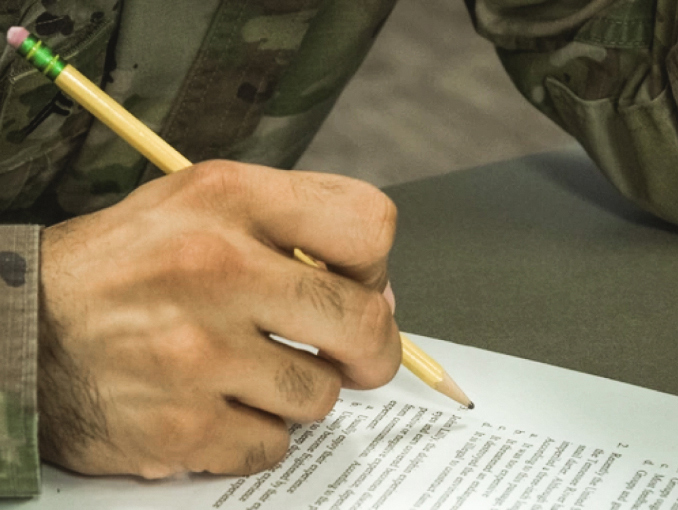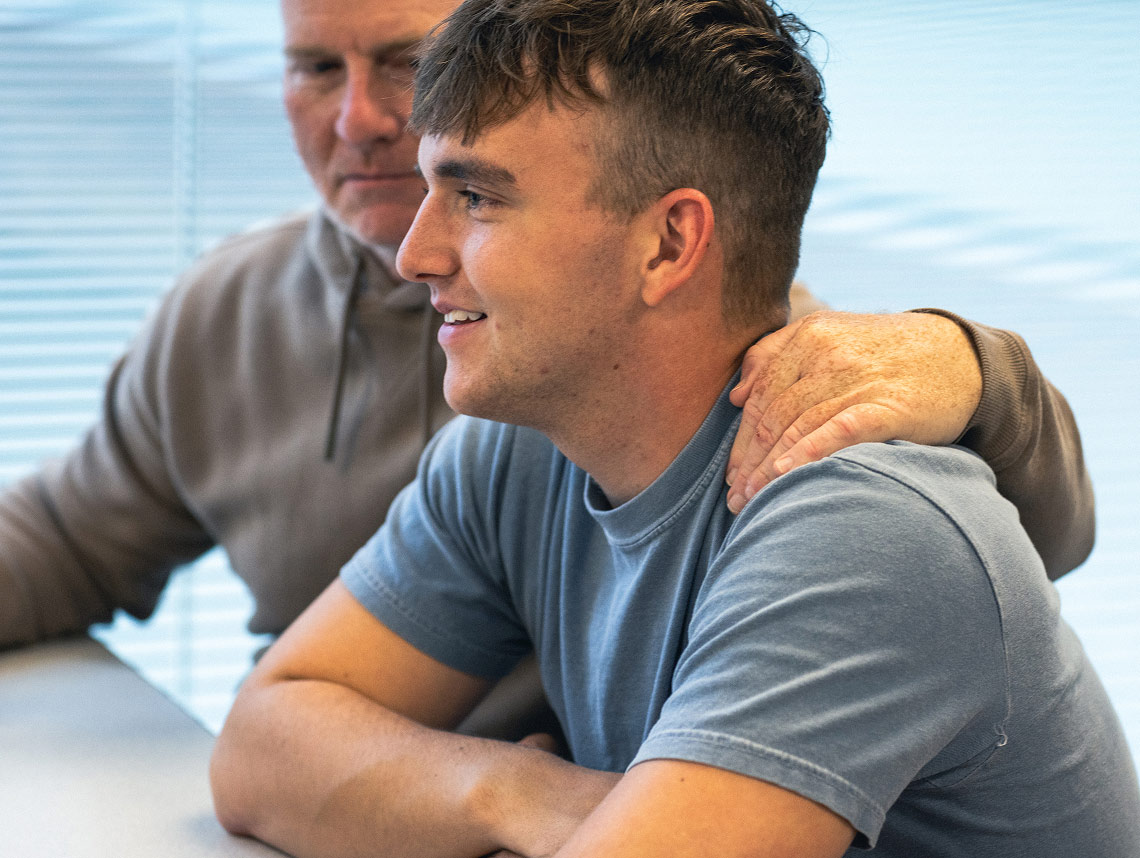Talk to your recruiter about what to expect.
Your recruiter will help you set up the test appointment and talk to you about how ASVAB scoring works. They can’t help you study, but they’ll help connect you to resources you need.
The Armed Services Vocational Aptitude Battery (ASVAB) is a standardized test on science, math, and language that helps identify which careers may be a fit for you when you join.
Find
Find
your
your
strengths.
strengths.
Every enlisted Soldier takes the ASVAB. You’ll be given all the tools you need to make it a smooth test experience. Follow these steps to stay ready as your test date approaches.
Your recruiter will help you set up the test appointment and talk to you about how ASVAB scoring works. They can’t help you study, but they’ll help connect you to resources you need.
Get familiar with ASVAB testing topics by requesting to take the pre-ASVAB test or downloading the free U.S. Army ASVAB Challenge app.
Know the time and location of your ASVAB test, which can be taken at a registered testing site or nearby Military Entrance Processing Station (MEPS) facility. Make sure to get plenty of rest the night before.
When you take the ASVAB entrance test, you’ll be scored in ten different subject areas and you’ll receive two types of ASVAB scores. First, your Armed Forces Qualification Test (AFQT) score determines your eligibility to join and requires a score of at least 31 to enlist. Second, your ASVAB category scores—also called line scores—determine job opportunities across different career categories.
General Sciences
Arithmetic Reasoning
Word Knowledge
Paragraph Comprehension
Mathematics Knowledge
Electronics Information
Auto and Shop Information
Mechanical Comprehension
Assembling Objects
Verbal Expression
After you receive your scores, you’ll have a better idea of which job opportunities you can pursue. Your ASVAB scores help indicate the job areas you’d excel in after you join as an enlisted Soldier. You may even discover new career paths you hadn’t considered.

Requires high scores in the Verbal Expression, Arithmetic Reasoning, and Mathematics Knowledge subjects and leads to jobs like the Human Resources Specialist (42A).
Requires high scores in the Verbal Expression, Auto and Shop Information, and Mechanical Comprehension subjects and leads to jobs like the Infantryman (11B).
Requires high scores in General Sciences, Arithmetic Reasoning, Mathematics Knowledge, and Electronic Information subjects and leads to jobs like the Radar Repairer (94M).
Requires high scores in the Arithmetic Reasoning, Mathematics Knowledge, and Mechanical Comprehension subjects and leads to jobs like the Field Artillery Recruit (13U).
Requires high scores in the General Science, Auto and Shop Information, Mathematics Knowledge, and Electronics Information subjects and leads to jobs like the Parachute Rigger (92R).
Requires high scores in the Verbal Expression and Arithmetic Reasoning subjects and leads to jobs like the Stryker Systems Maintainer (91S).
Requires high scores in the Auto and Shop Information, Mechanical Comprehension, and Electronic Information subjects and leads to jobs like the Self Propelled Artillery Maintainer (91P).
Requires high scores in the Verbal Expression, Auto and Shop Information, and Mechanical Comprehension subjects and leads to jobs like the Culinary Specialist (92G).
Requires high scores in the Verbal Expression, Arithmetic Reasoning, Auto and Shop Information, and Mechanical Comprehension subjects and leads to jobs like the Electronic Warfare Specialist (17E).
Requires high scores in the General Sciences, Verbal Expression, Mechanical Comprehension, and Mathematics Knowledge subjects and leads to jobs like the Ammunition Specialist (89B).
Take the Soldier Prep Quiz to find out how you can become part of the greatest team in the world.

Find out more about becoming a Soldier and if a career in the Army is right for you.
Not finding what you need?
Chat with us any time.
You can take the ASVAB test multiple times, but there are rules regarding how frequently. After your first attempt, you must wait one calendar month to retake the test. Your third attempt can be administered no earlier than six calendar months after your second test. It’s important to remember that your most recent score—not your highest—will be used to assess your performance. Talk to your recruiter if you have any questions or concerns.
To enlist, you need an ASVAB score of at least 31. However, if you have a minimum score of 21, there’s an academic track of the Future Soldier Preparatory Course to help you better your score. This 90-day program provides training on all the subjects covered on the ASVAB, as well as opportunities to retake the test.
If your ASVAB score is between 31 and 49, you could qualify for a second option of the course that’s 30 days of classes with one chance to improve your score. You may select a new MOS based on your higher score depending on the needs of the Army.
Additionally, there’s an expanded course that allows you to first take the academic track to improve your ASVAB score and then move into the fitness track of the course to help you meet the physical requirements if your body fat percentage exceeds the Army standard.
Find out more about the ASVAB entrance test and work with your recruiter to see which Future Soldier Preparatory Course option is right for you.
The ASVAB entrance test is only administered in English. Applicants need to demonstrate English language comprehension and fluency to complete tasks and understand commands.
The computer adaptive test (CAT-ASVAB) adjusts to your knowledge level in real-time. Note that around 70% of military applicants take the test online, and on average, it takes about half the time as the paper version.
Yes, the Pending Internet Computerized Adaptive Test (PiCAT) is an alternative to current ASVAB testing procedures. It is an unsupervised, full version of the ASVAB you may take on your own time. Contact your recruiter to learn more about taking it and validating your results on your visit to a Military Entrance Processing Station (MEPS).
If you attend Officer Candidate School after you enlist, you will have taken the ASVAB as part of the enlistment process. But, you do not take the ASVAB if you join the Army through a direct commission as an Officer, or through ROTC or U.S. Military Academy at West Point, where you graduate with a college degree and as a commissioned Army Officer.
You have no saved jobs.
Take a short quiz or explore more than 200 jobs that might interest you.
Army Career Match